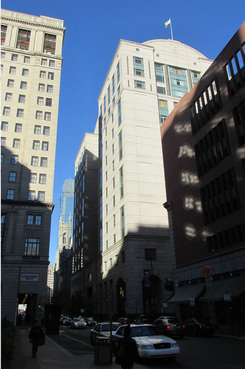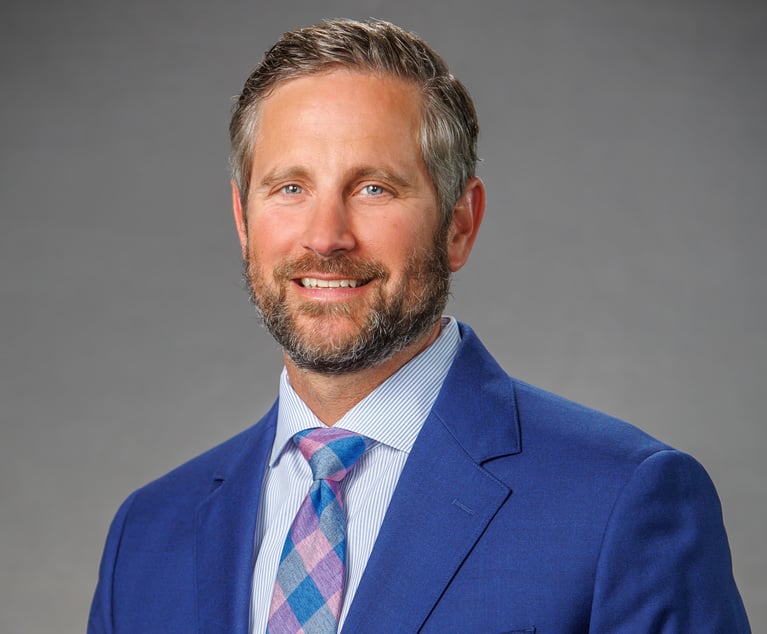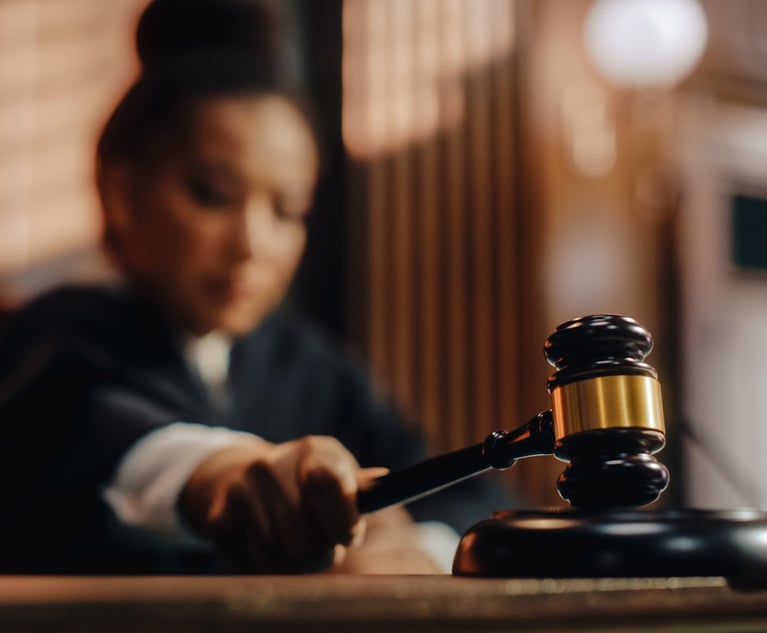Special Prosecutor Appointed to Replace DA in Probation Matter Wants Off Case
The attorney appointed last month as a special prosecutor by a judge—in the wake of her finding that the Philadelphia District Attorney's Office had "removed" itself from the case—has asked to be relieved from his duty, saying another Philadelphia judge has taken issue with the appointment.
October 22, 2018 at 03:38 PM
5 minute read
 Criminal Justice Center in Philadelphia.
Criminal Justice Center in Philadelphia.
Photo: Wikimedia Commons
The attorney appointed last month as a special prosecutor by a judge—in the wake of her finding that the Philadelphia District Attorney's Office had “removed” itself from the case—has asked to be relieved from his duty, saying another Philadelphia judge has taken issue with the appointment.
James Lloyd of Parkinson, Tarpey & Lloyd has filed a motion asking Common Pleas Judge Anne Marie Coyle to replace him with a new attorney in the case Commonwealth v. Mayfield.
The case grabbed headlines in late September after Coyle made the controversial move to appoint Lloyd as special prosecutor. Court documents show that Coyle appointed Lloyd after the assistant district attorneys assigned to the case refused to go ahead with a violation of probation hearing. The defendant, Demetrius Mayfield, had been on probation from a previous conviction, when he was arrested again on new charges. Mayfield was jailed following his second arrest, and the prosecutors had wanted to wait until after Mayfield could be tried on the new charges before holding the probation hearing, but Coyle said that not pursuing the hearing meant the prosecutors had “removed themselves.”
“I'm sorry the district attorney does not like the law as it exists. My suggestion is if you don't like the law as it exists, talk to your legislature,” Coyle said on Sept. 27, according to transcripts. “It is the job of the district attorney to enforce the law as it exists and represent the interests of the commonwealth of Pennsylvania. Not the law that he wishes it to be.”
The District Attorney's Office has appealed the decision, and the case has been stayed pending a review by the state Superior Court, but Lloyd filed a motion Oct. 3, asking to be let out of the case.
In the three-page motion, Lloyd said that another Philadelphia judge told him he could no longer represent criminal defendants in any court in Pennsylvania while he acted as special prosecutor. Lloyd said that forcing him to act as a special prosecutor would “jeopardize” his practice.
“One hundred percent of the undersigned's practice consists of criminal defense in Pennsylvania courts. Undersigned counsel has no other employment or source of income,” Lloyd said. “As there are dozens of active attorneys with significant experience as prosecutors in the Philadelphia Court of Common Pleas who do not engage in criminal defense, movant respectfully requests that this honorable court modify its order of September 20, 2018, and substitute another qualified attorney for the undersigned.”
Lloyd did not name the judge who told him he couldn't represent defendants while acting as a special prosecutor, but, according to Lloyd's motion, the judge cited a Pennsylvania Bar Association ethics opinion from 1973 regarding whether it is ethical for an attorney acting as a part-time assistant district attorney in one county to represent defendants in another county in the state.
The ethics opinion said, “The district attorney, or his assistants would be opposing the interests of the commonwealth if any of them represented persons accused of crime in another county where the commonwealth is a party to the proceedings,” and answered the question of whether the scenario would be ethical “in the negative.”
Montoya Coleman attorney Joseph Coleman, who is representing Mayfield, said he has been making the same argument since Coyle appointed Lloyd late last month.
“It's a conflict of interest,” Coleman said.
A spokesman with the DA's Office declined to comment since the case is ongoing.
Ethics attorney Abraham Reich of Fox Rothschild, however, said he did not think that being appointed as a special prosecutor would necessarily mean a defense attorney couldn't continue representing defendants.
“He certainly couldn't be a prosecutor and a defense counsel in the same case, or a related matter, but in a totally unrelated matter? I don't see it,” he said.
Reich, however, agreed with numerous other attorneys who said it is generally not appropriate for a judge to appoint a special prosecutor to step into the role of the elected prosecutor unless the District Attorney's Office has a conflict of interest, or is unable to prosecute the case.
In the wake of Coyle's decision to appoint a special prosecutor, which was first reported on by PhillyVoice.com, several criminal defense attorneys and former prosecutors told The Legal they were shocked by the move, and that it may go against the separation of powers doctrine. Attorneys also said the appointment fit into a broader pattern, where Coyle appeared to overstep her role as a judge and appeared to be “prosecuting from the bench.”
Coyle's chambers declined to comment Monday afternoon. Lloyd also did not return a call seeking comment.
This content has been archived. It is available through our partners, LexisNexis® and Bloomberg Law.
To view this content, please continue to their sites.
Not a Lexis Subscriber?
Subscribe Now
Not a Bloomberg Law Subscriber?
Subscribe Now
NOT FOR REPRINT
© 2025 ALM Global, LLC, All Rights Reserved. Request academic re-use from www.copyright.com. All other uses, submit a request to [email protected]. For more information visit Asset & Logo Licensing.
You Might Like
View All
Kline & Specter and Bosworth Resolve Post-Settlement Fighting Ahead of Courtroom Showdown
6 minute read

'Discordant Dots': Why Phila. Zantac Judge Rejected Bid for His Recusal
3 minute read
Phila. Court System Pushed to Adapt as Justices Greenlight Changes to Pa.'s Civil Jury Selection Rules
5 minute readTrending Stories
- 15th Circuit Considers Challenge to Louisiana's Ten Commandments Law
- 2Crocs Accused of Padding Revenue With Channel-Stuffing HEYDUDE Shoes
- 3E-discovery Practitioners Are Racing to Adapt to Social Media’s Evolving Landscape
- 4The Law Firm Disrupted: For Office Policies, Big Law Has Its Ear to the Market, Not to Trump
- 5FTC Finalizes Child Online Privacy Rule Updates, But Ferguson Eyes Further Changes
Who Got The Work
J. Brugh Lower of Gibbons has entered an appearance for industrial equipment supplier Devco Corporation in a pending trademark infringement lawsuit. The suit, accusing the defendant of selling knock-off Graco products, was filed Dec. 18 in New Jersey District Court by Rivkin Radler on behalf of Graco Inc. and Graco Minnesota. The case, assigned to U.S. District Judge Zahid N. Quraishi, is 3:24-cv-11294, Graco Inc. et al v. Devco Corporation.
Who Got The Work
Rebecca Maller-Stein and Kent A. Yalowitz of Arnold & Porter Kaye Scholer have entered their appearances for Hanaco Venture Capital and its executives, Lior Prosor and David Frankel, in a pending securities lawsuit. The action, filed on Dec. 24 in New York Southern District Court by Zell, Aron & Co. on behalf of Goldeneye Advisors, accuses the defendants of negligently and fraudulently managing the plaintiff's $1 million investment. The case, assigned to U.S. District Judge Vernon S. Broderick, is 1:24-cv-09918, Goldeneye Advisors, LLC v. Hanaco Venture Capital, Ltd. et al.
Who Got The Work
Attorneys from A&O Shearman has stepped in as defense counsel for Toronto-Dominion Bank and other defendants in a pending securities class action. The suit, filed Dec. 11 in New York Southern District Court by Bleichmar Fonti & Auld, accuses the defendants of concealing the bank's 'pervasive' deficiencies in regards to its compliance with the Bank Secrecy Act and the quality of its anti-money laundering controls. The case, assigned to U.S. District Judge Arun Subramanian, is 1:24-cv-09445, Gonzalez v. The Toronto-Dominion Bank et al.
Who Got The Work
Crown Castle International, a Pennsylvania company providing shared communications infrastructure, has turned to Luke D. Wolf of Gordon Rees Scully Mansukhani to fend off a pending breach-of-contract lawsuit. The court action, filed Nov. 25 in Michigan Eastern District Court by Hooper Hathaway PC on behalf of The Town Residences LLC, accuses Crown Castle of failing to transfer approximately $30,000 in utility payments from T-Mobile in breach of a roof-top lease and assignment agreement. The case, assigned to U.S. District Judge Susan K. Declercq, is 2:24-cv-13131, The Town Residences LLC v. T-Mobile US, Inc. et al.
Who Got The Work
Wilfred P. Coronato and Daniel M. Schwartz of McCarter & English have stepped in as defense counsel to Electrolux Home Products Inc. in a pending product liability lawsuit. The court action, filed Nov. 26 in New York Eastern District Court by Poulos Lopiccolo PC and Nagel Rice LLP on behalf of David Stern, alleges that the defendant's refrigerators’ drawers and shelving repeatedly break and fall apart within months after purchase. The case, assigned to U.S. District Judge Joan M. Azrack, is 2:24-cv-08204, Stern v. Electrolux Home Products, Inc.





